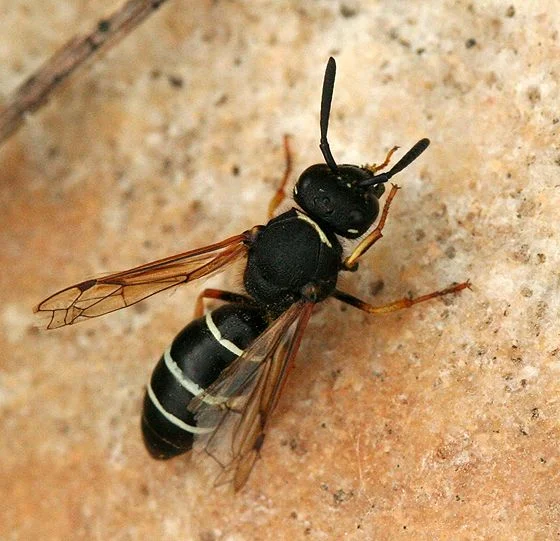Black wasps are a common sight across Canada, from the urban gardens of Toronto to the forests of British Columbia. While their dark, intimidating appearance may cause alarm, most black wasps are non-aggressive and beneficial to the ecosystem. However, certain species can deliver painful stings if provoked. If you’ve encountered a big black wasp in your yard or home, this guide will help you understand what they are, whether they’re dangerous, and how to manage them safely.
What Are Black Wasps?
Black wasps belong to various species, but the most commonly seen in Canada include:
1. Great Black Wasp (Sphex pensylvanicus)
- Size: 1 to 1.5 inches long
- Appearance: Entirely black with blue-black iridescent wings
- Behavior: Solitary, non-aggressive, and excellent pollinators
- Habitat: Meadows, gardens, and wooded areas
2. Bald-Faced Hornet (Dolichovespula maculata)
- Size: 0.5 to 0.75 inches long
- Appearance: Black with white facial markings
- Behavior: Social, builds large paper nests, can be aggressive if disturbed
- Habitat: Trees, shrubs, and under eaves
3. Steel-Blue Cricket Hunter (Chlorion aerarium)
- Size: 0.8 to 1.2 inches long
- Appearance: Metallic blue-black body
- Behavior: Hunts crickets and grasshoppers, rarely stings humans
- Habitat: Dry, sandy areas
Are Black Wasps Dangerous?
The great black wasp and other solitary species are not typically aggressive toward humans. However:
They can sting if handled or threatened (females have stingers).
Their sting is painful but rarely dangerous unless you’re allergic.
Bald-faced hornets are more defensive and may attack if their nest is disturbed.
Black Wasp Sting Symptoms
- Immediate sharp pain
- Redness and swelling
- Mild itching or burning
- Severe reactions (rare): Difficulty breathing, dizziness (seek medical help)
Where Do Black Wasps Live in Canada?
Black wasps are found nationwide, with different species preferring various habitats:
1. Great Black Wasp (Sphex pensylvanicus)
- Common in: Ontario, Quebec, Alberta
- Nests: Underground burrows in sandy soil
2. Bald-Faced Hornet (Dolichovespula maculata)
- Common in: British Columbia, Manitoba, Nova Scotia
- Nests: Large, gray paper nests in trees or on buildings
3. Steel-Blue Cricket Hunter (Chlorion aerarium)
- Common in: Prairies and dry regions of Saskatchewan
- Nests: Small holes in the ground
How to Identify a Black Wasp Nest
Great Black Wasp Nest
- Small, single-cell burrows in loose soil
- Often near gardens or flower beds
Bald-Faced Hornet Nest
- Football-shaped, gray paper nests
- Hangs from tree branches or roof overhangs
Cricket Hunter Nest
- Tiny holes in dry, sandy ground
Do Black Wasps Benefit the Environment?
Despite their fearsome appearance, black wasps are valuable for pest control:
Great black wasps hunt grasshoppers and katydids.
Cricket hunters reduce cricket populations.
Bald-faced hornets eat flies and caterpillars.
They also pollinate flowers while searching for nectar.
How to Prevent Black Wasps Around Your Home
1. Seal Entry Points
- Repair cracks in foundations, walls, and roofs.
- Install fine mesh screens on windows and vents.
2. Remove Food Sources
- Keep garbage bins tightly sealed.
- Avoid leaving sweet drinks or food outdoors.
3. Limit Nesting Sites
- Fill abandoned rodent burrows (great black wasps use them).
- Trim overgrown bushes and trees near your house.
4. Use Natural Repellents
- Peppermint oil (spray around entry points).
- Citronella candles (deter flying insects).
What to Do If You Find a Black Wasp Nest
Non-Aggressive Wasps (Great Black Wasp, Cricket Hunter)
- Leave them alone—they rarely sting and help control pests.
- If the nest is in a high-traffic area, wait until evening (when they’re less active) and relocate it carefully.
Aggressive Wasps (Bald-Faced Hornet)
- Do not disturb the nest—they swarm when threatened.
- Call a professional pest control service like IPM Pest Solutions for safe removal.
Professional Black Wasp Removal in Canada
If you have a black wasp infestation in Toronto, Vancouver, Calgary, or other Canadian cities, IPM Pest Solutions provides:
Safe nest removal (without harming beneficial species).
Eco-friendly treatments (low-toxicity solutions).
Prevention strategies (to keep wasps from returning).
Myths vs. Facts About Black Wasps
Myth: “All black wasps are aggressive.”
Fact: Most are solitary and avoid humans.
Myth: “Black wasps destroy gardens.”
Fact: They control pests that harm plants.
Myth: “Killing one wasp attracts more.”
Fact: This is false—wasps don’t release alarm pheromones like bees.
Should You Worry About Black Wasps?
Most black wasps in Canada are harmless unless provoked. The great black wasp and cricket hunter are beneficial, while bald-faced hornets require caution. If you’re dealing with a nest near your Ontario home or business, IPM Pest Solutions offers expert wasp control to keep your property safe.


